The Government is Spending Like There’s No Tomorrow
As the government spends frivolously to prevent a recession, the traditional monetary system seems to be growing more fragile as it fractures under the weight of enormous amounts of debt.
Swan Bitcoin Market Update #39
This Insight Report was originally sent to Swan Private clients on October 13th, 2023. Swan Private guides corporations and high net worth individuals globally toward building generational wealth with Bitcoin.
Benefits of Swan Private include:
- Dedicated account rep accessible by text, email, and phone
- Timely market updates (like this one)
- Exclusive monthly research report (Insight) with contributors like Lyn Alden
- Invitation-only live sessions with industry experts (webinars and in-person events)
- Hold Bitcoin directly in your Traditional or Roth IRA
- Access to Swan’s trusted Bitcoin experts for Q&A
“I have spent most of my life worrying about things that have never happened.” - Mark Twain
Heading into 2023, many market participants feared that a recession was on the horizon. Doom and gloom filled the headlines as investors worried that asset prices were about to crash and the economy was set to grind to a halt. It was hard to see how an economic downturn was not imminent.
With the Federal Reserve raising interest rates at the fastest pace in its history, in an economy that gorged itself on cheap debt after nearly a decade of artificially low rates, it seemed like it was only a matter of time before things would start to break.
The graphic below, although from May, does a good job highlighting the sheer speed of the Federal Reserve’s rate hikes. An additional 0.25% rate hike has occurred since this graphic was made.

An ultra-hawkish Federal Reserve is what led to Bloomberg forecasting a 100% chance of a recession almost exactly one year ago.
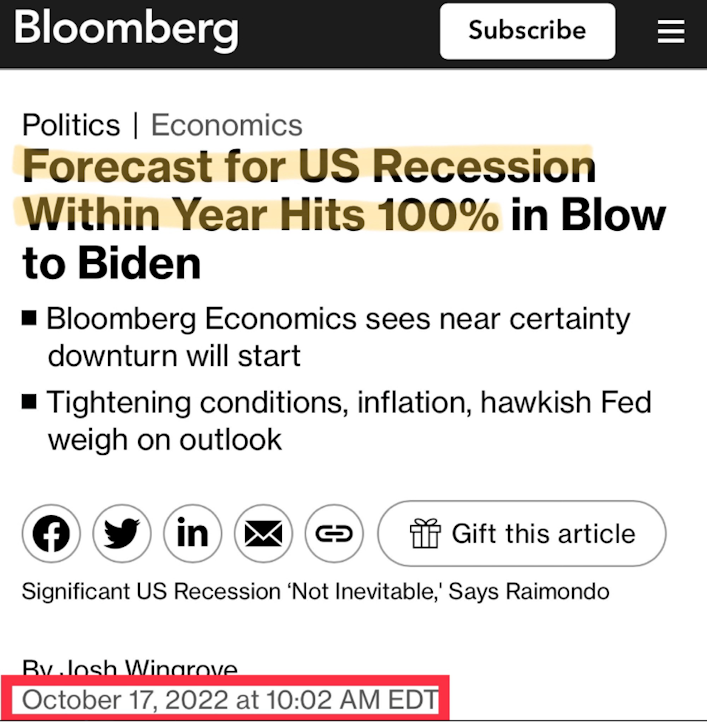
And yet, the recession everyone feared never came. The headline above highlights the consensus view as we entered this year. Everyone thought assets were going to crash when instead they soared.
Asset classes like stocks and Bitcoin have rallied strongly in 2023, leaving many market participants behind as they waited to “buy the dip.”
Bitcoin and equities have been some of the best-performing asset classes year-to-date.
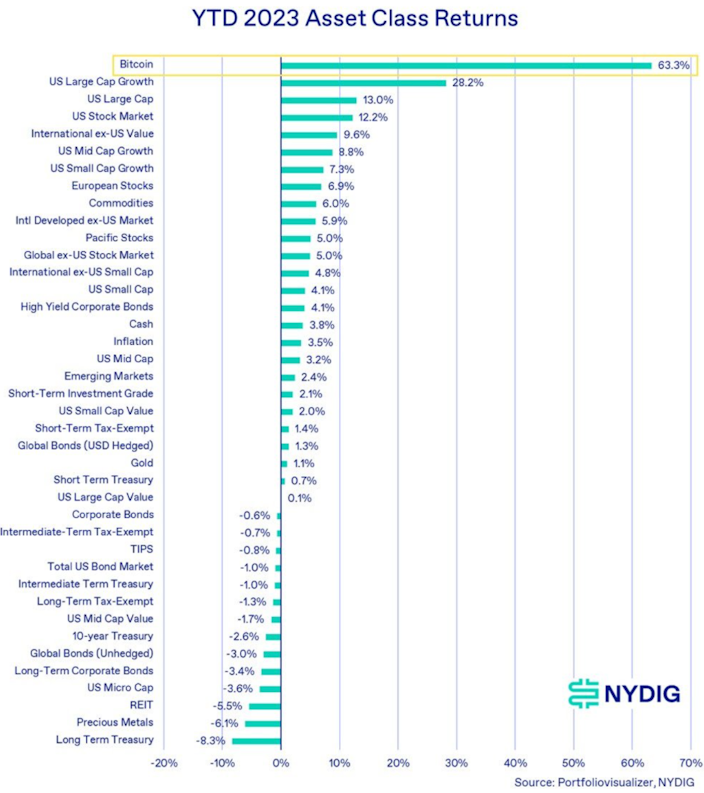
It leads to the question, why were so many investors wrong? Why hasn’t a recession transpired like so many thought it would?
Although it’s impossible to pinpoint an exact reason why a recession hasn’t come to fruition, one significant explanation could be that the government is currently running massive fiscal deficits, which could be offsetting the tighter financial conditions.
The Congressional Budget Office released its budget review of the fiscal year 2023 and found that the budget deficit totaled $1.7 trillion, $166 billion of which was in September alone. The fiscal deficit has nearly doubled from the year prior.
Maya MacGuineas, President of the Committee for a Responsible Federal Budget, did not mince her words in response to the large deficit spending:
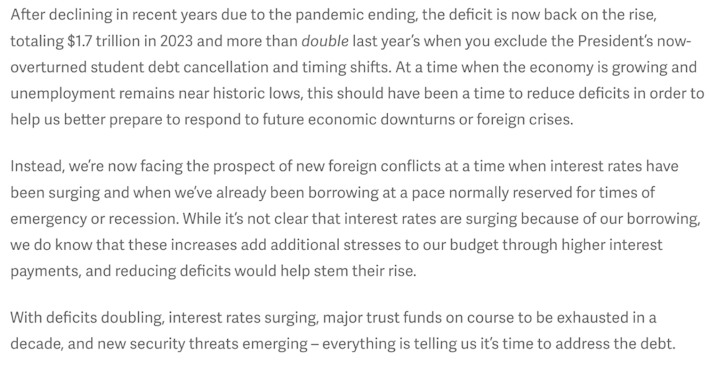
CBO
You can hear from her tone above — President MacGuineas is concerned about the United States’s fiscal position. But if there is one positive to be found from this recent rise in government spending, it’s that it does seem to have helped stimulate the economy, at least in the short term.
When a government spends money — whether it’s on infrastructure, social programs, or other expenditures — that money doesn’t just disappear. It gets paid to workers, contractors, suppliers, etc. These recipients then spend a portion of their income, which becomes someone else’s income, and so on. This chain reaction can lead to an overall increase in economic activity that is a multiple of the original government expenditure.
With this increased government spending, real GDP has soared to levels well above the historical average. The Federal Reserve Bank of Atlanta’s GDPNow metric now sits at 5.4%, well above average forecasts.
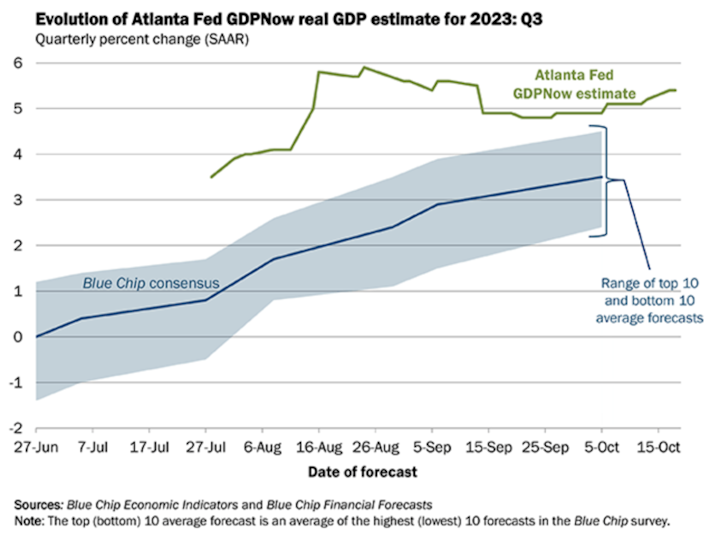
This is only likely to continue too. The CBO projects that the US will continue to run trillion-dollar deficits for the foreseeable future.
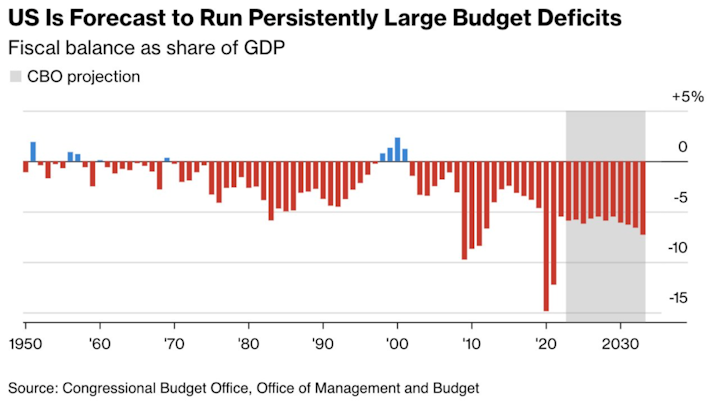
How much this GDP growth is a result of the large fiscal deficits run over the last three years is difficult to quantify, but it is certainly a contributing factor. This could be why a recession has not yet unfolded as many predicted. In layman’s terms, the government has been busy spending to keep the economy afloat.
A key point from President MacGuineas’s statement above was, “At a time when the economy is growing and unemployment remains at historic lows, this should be a time to reduce deficits.”
Historically, the US has run large fiscal deficits in response to an economic downturn to counteract the decline and stimulate economic growth. Today, it’s almost as if the government is preemptively running large deficits to try to prevent a recession from occurring in the first place.
The government is spending like there is no tomorrow, but it’s important to recognize that there are long-term future implications for running persistently high deficits like this.
The question becomes two-fold: 1.) How does the government finance these deficits? and 2.) What happens to the deficit if an economic downturn does occur?
Both answers are straightforward: 1.) More debt and 2.) the deficit will explode.
As the government has run these massive deficits, it has financed them by borrowing. This has caused total US debt to explode higher at a scary pace.
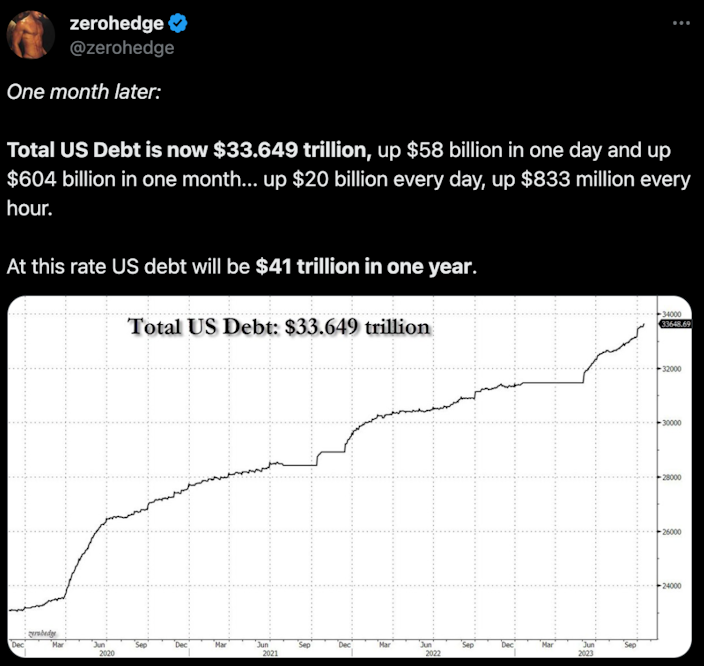
The Treasury has already issued more than $1.76 billion of Treasurys through September to fund these deficits, higher than any year in the past 10 years, excluding the 2020 pandemic.
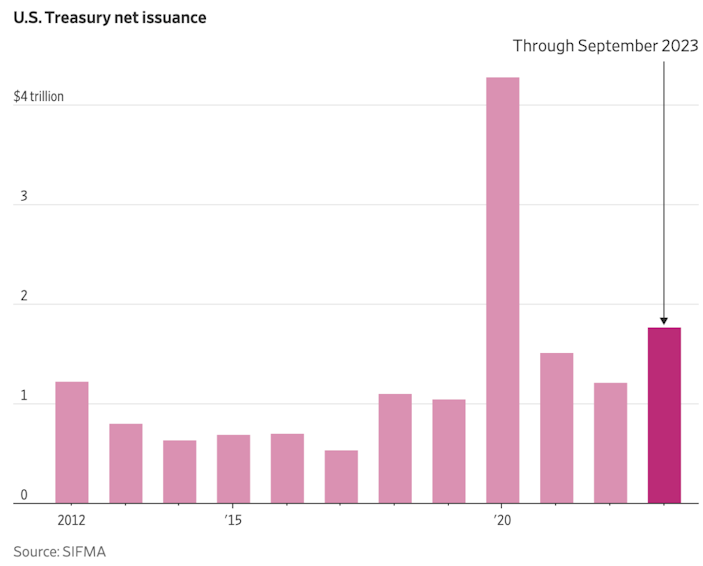
Estimates suggest that Treasury issuance will only continue into 2024. Apollo Global Management forecasts that Treasury issuance will increase on average 23% across the entire yield curve next year.

The government can try to finance these deficits through new Treasurys, but at what price?
As fiscal authorities flood the market with newly-issued Treasurys, the risk for them is that there will not be sufficient demand for them at the current yields. If yields rise, then that increases the interest expense on the existing mountain of debt.
Already, interest expense on the public debt has risen to $833 billion over the past year, a record high.
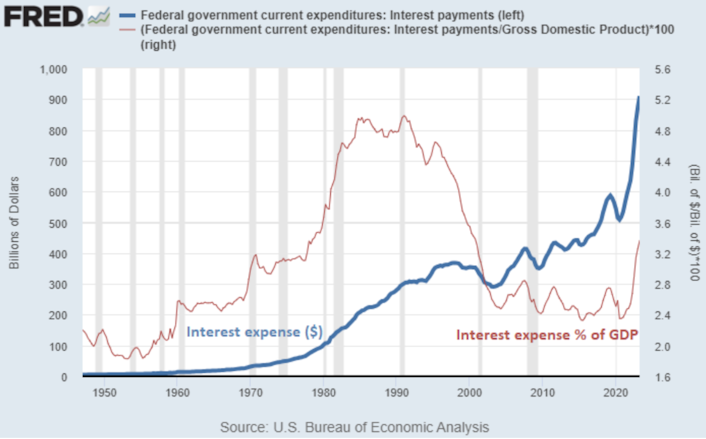
As more Treasurys enter the market, investors start to demand a higher yield due to long-term inflation concerns and worries about the sustainability of the national debt.
Lately, we have observed this dynamic play out as Treasury yields have risen to levels not seen since the Global Financial Crisis.
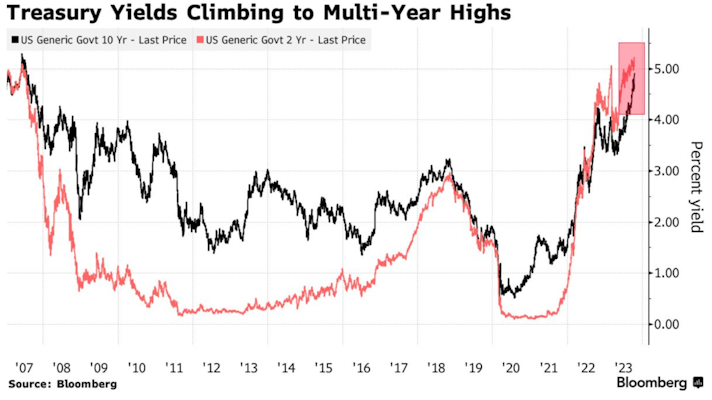
As Treasury yields rise, the deficit only grows larger as the interest expense rises. This phenomenon is commonly referred to as the “debt spiral”. The difference today is that this debt spiral isn’t just being discussed in Bitcoin circles, but rather it’s entering the national discussion.
Bitcoin is the Money of Tomorrow
Billionaire Paul Tudor Jones recently talked about these debt dynamics in an interview on CNBC stating,
“You get in this vicious circle, where higher interest rates cause higher funding costs, cause higher debt issuance, which cause further bond liquidation, which cause higher rates, which put us in an untenable fiscal position.”
PTJ continued, “It might be the most threatening and challenging geopolitical environment that I’ve ever seen. It is also happening at the same time the US in its weakest fiscal position since World War II.”
When asked how he’s playing this precarious fiscal situation, PTJ replied, “I like Bitcoin.”
Another giant in the financial world, CEO of Blackrock Larry Fink, also verbalized support of Bitcoin on national television. In response to a false rumor that the Blackrock spot Bitcoin ETF had been approved, Fink said, “This rally today is way beyond the Bitcoin spot ETF rumor. The rally today is about a flight to quality.”
All of this is evidence that Bitcoin is starting to be recognized by big players as not a speculative asset, but rather as a protective asset from the long-term negative consequences of a government with a chronic spending problem.
With the outbreak of war in the Middle East, it doesn’t look like the government will rein in its spending anytime soon either. Government officials appear to think there are no limits to the amount of money they can spend.
On 60 Minutes, Treasury Secretary Janet Yellen stated that the US could afford to finance two wars despite domestic inflation running hot and public debt recently hitting record highs. Yellen said, “We do need to come up with funds, both for Israel and for Ukraine. This is a priority. It’s really up to the House to put us in a position where legislation can be passed.”
President Joe Biden is expected to ask Congress for an additional $100 billion funding request for foreign aid in response to the war in the coming days.
This comes as the US has already sent over $75 billion in aid, the equivalent of over two annual NASA budgets, to Ukraine last year alone.
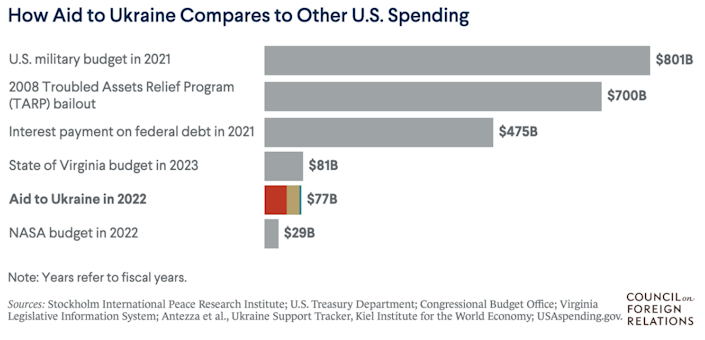
Whether you agree with supporting these foreign wars or not, the outcome remains the same — the US spending more money it does not have, which will only grow the national debt, which is already at an unsustainable level.
Even Federal Chairman Jerome Powell agrees. He offered a rare comment on the current fiscal situation in his latest interview at the Economic Club of New York, “Everyone knows — it’s not a secret…We know that we’re on an unsustainable path fiscally.”
If what Powell says is true, and everyone already knows we’re on an unsustainable path fiscally, perhaps people are finally starting to wake up to Bitcoin’s value proposition as an alternative to the debt-based financial system that appears to be on its last legs. Bitcoin is up 8.4% over the last month alone.
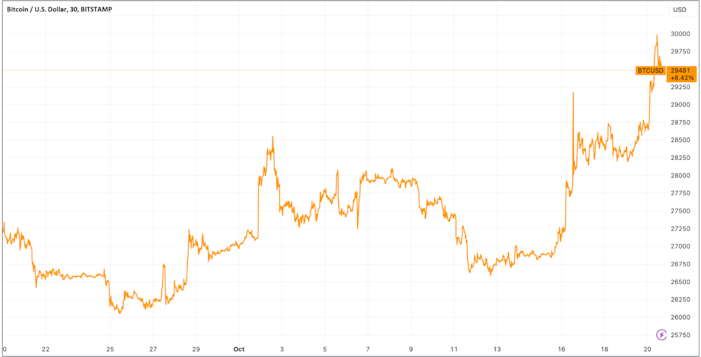
One potential driver of this price move could be related to renewed market optimism around a spot Bitcoin ETF approval. In a recent research report, JP Morgan Chase noted that it gives the highest probability of a spot Bitcoin ETF approval occurring before January 10th. ETF Analysts from Bloomberg attributed a 90% chance of a spot Bitcoin ETF approval in January.
One market metric that represents a good proxy for the likelihood of a spot Bitcoin ETF approval is the GBTC Premium/Discount to NAV. That discount has narrowed to -13.3%, a level not seen since November 2021.
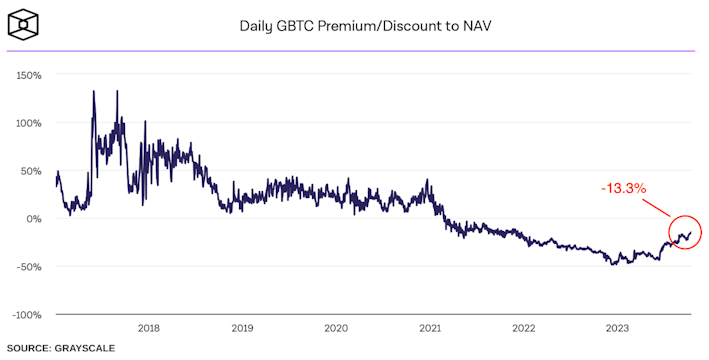
As the market positively responds to an increased probability of a spot Bitcoin ETF approval, Bitcoiners continue to build and innovate. There were two exciting announcements in the world of Bitcoin development over the last two weeks.
The first one was BitVM — a new solution that could enable all kinds of new functionality on Bitcoin without requiring any soft or hard fork.
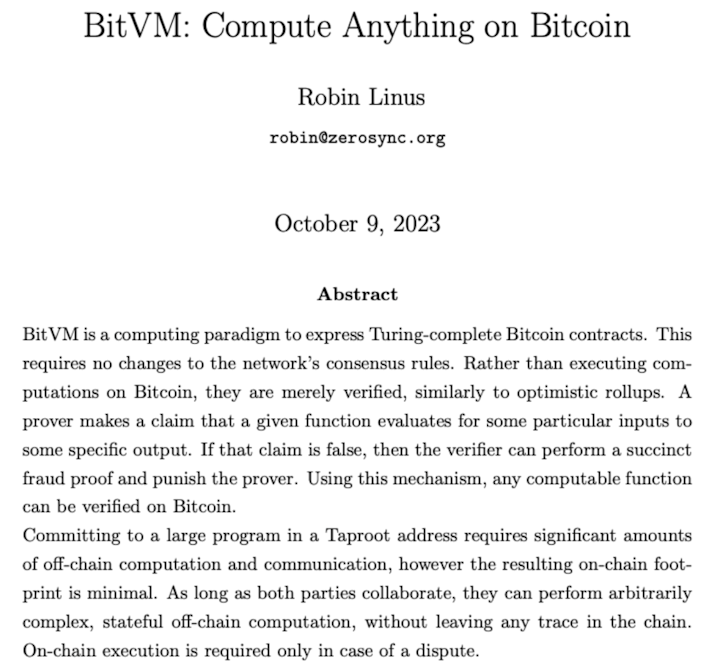
Personally, I liked how Preston Pysh described the potential of BitVM.

The other innovation was Lightning Labs announcing the launch of Taproot Assets. Taproot Assets provides “a feature-complete developer experience for issuing, managing, and exploring stablecoins or other assets on the Bitcoin blockchain.”
Both of these developments underscore Bitcoin’s programmable nature and how it continues to evolve. The Bitcoin network will continue to scale and provide additional functionality over time in a manner that maintains its decentralization and security. As the government spends frivolously to prevent a recession, the traditional monetary system seems to be growing more fragile as it fractures under the weight of enormous amounts of debt. At the same time, you have the Bitcoin monetary system only growing stronger and more resilient. As Bitcoin becomes increasingly useful as a monetary network, it’s only a matter of time before more people, like PTJ did last week, start singing its praises.
Market Overview
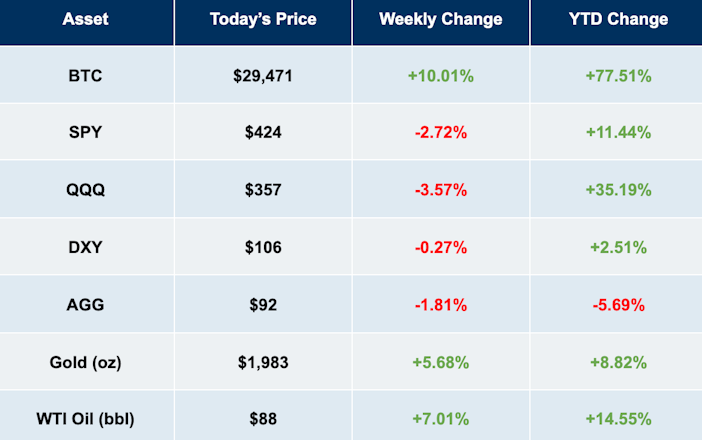
Swan IRA — Real Bitcoin, No Taxes*
Hold your IRA with the most trusted name in Bitcoin.
Sam Callahan is the Lead Analyst at Swan Bitcoin. He graduated from Indiana University with degrees in Biology and Physics before turning his attention towards the markets. He writes the popular “Running the Numbers” section in the monthly Swan Private Insight Report. Sam’s analysis is frequently shared across social media, and he’s been a guest on popular podcasts such as The Investor’s Podcast and the Stephan Livera Podcast.
More from Swan Signal Blog
Thoughts on Bitcoin from the Swan team and friends.


Running the Numbers: How Fiat Pushed the American Dream Away from Millennials
By Sam Callahan
Bitcoin symbolizes hope for a generation who increasingly feel as though their futures have been stolen from them by the traditional fiat system.


Best Bitcoin ETF Fees: Lowest to Highest (May 2024)

By Matt Ruby
In this guide, we analyze and present the top 10 Bitcoin ETFs with the lowest fees for cost-effective investing.


Privacy, Executive Order 6102 & Bitcoin

By Steven Lubka
Let’s keep pushing forward for the future we want to see, one in which both the price of Bitcoin and global freedom can go up together.
